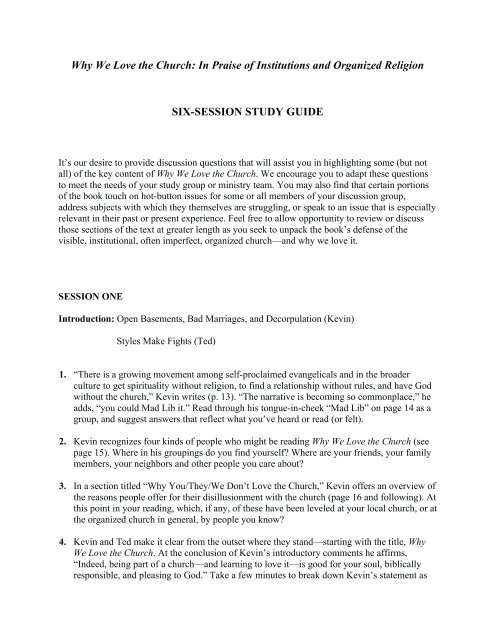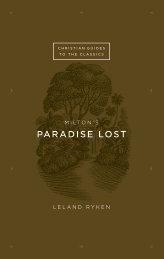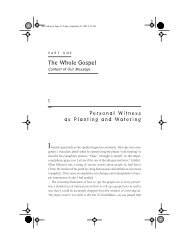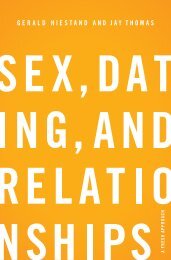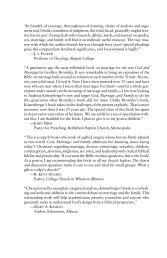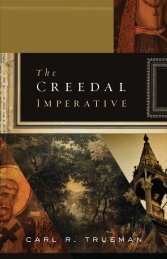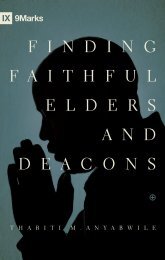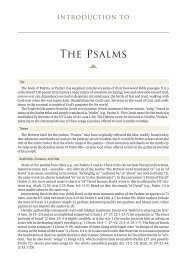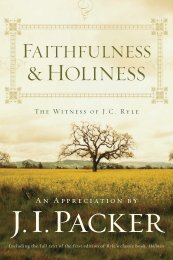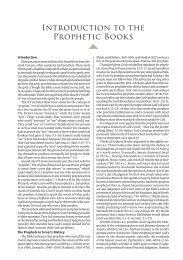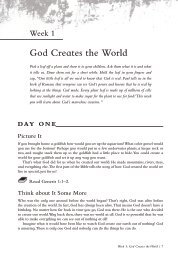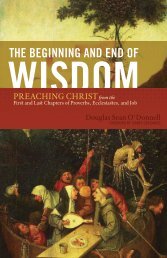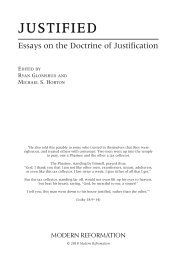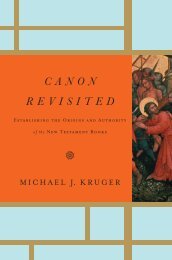Why We Love the Church: In Praise of Institutions and Organized ...
Why We Love the Church: In Praise of Institutions and Organized ...
Why We Love the Church: In Praise of Institutions and Organized ...
Create successful ePaper yourself
Turn your PDF publications into a flip-book with our unique Google optimized e-Paper software.
<strong>Why</strong> <strong>We</strong> <strong>Love</strong> <strong>the</strong> <strong>Church</strong>: <strong>In</strong> <strong>Praise</strong> <strong>of</strong> <strong>In</strong>stitutions <strong>and</strong> <strong>Organized</strong> ReligionSIX-SESSION STUDY GUIDEIt’s our desire to provide discussion questions that will assist you in highlighting some (but notall) <strong>of</strong> <strong>the</strong> key content <strong>of</strong> <strong>Why</strong> <strong>We</strong> <strong>Love</strong> <strong>the</strong> <strong>Church</strong>. <strong>We</strong> encourage you to adapt <strong>the</strong>se questionsto meet <strong>the</strong> needs <strong>of</strong> your study group or ministry team. You may also find that certain portions<strong>of</strong> <strong>the</strong> book touch on hot-button issues for some or all members <strong>of</strong> your discussion group,address subjects with which <strong>the</strong>y <strong>the</strong>mselves are struggling, or speak to an issue that is especiallyrelevant in <strong>the</strong>ir past or present experience. Feel free to allow opportunity to review or discussthose sections <strong>of</strong> <strong>the</strong> text at greater length as you seek to unpack <strong>the</strong> book’s defense <strong>of</strong> <strong>the</strong>visible, institutional, <strong>of</strong>ten imperfect, organized church—<strong>and</strong> why we love it.SESSION ONE<strong>In</strong>troduction: Open Basements, Bad Marriages, <strong>and</strong> Decorpulation (Kevin)Styles Make Fights (Ted)1. “There is a growing movement among self-proclaimed evangelicals <strong>and</strong> in <strong>the</strong> broaderculture to get spirituality without religion, to find a relationship without rules, <strong>and</strong> have Godwithout <strong>the</strong> church,” Kevin writes (p. 13). “The narrative is becoming so commonplace,” headds, “you could Mad Lib it.” Read through his tongue-in-cheek “Mad Lib” on page 14 as agroup, <strong>and</strong> suggest answers that reflect what you’ve heard or read (or felt).2. Kevin recognizes four kinds <strong>of</strong> people who might be reading <strong>Why</strong> <strong>We</strong> <strong>Love</strong> <strong>the</strong> <strong>Church</strong> (seepage 15). Where in his groupings do you find yourself? Where are your friends, your familymembers, your neighbors <strong>and</strong> o<strong>the</strong>r people you care about?3. <strong>In</strong> a section titled “<strong>Why</strong> You/They/<strong>We</strong> Don’t <strong>Love</strong> <strong>the</strong> <strong>Church</strong>,” Kevin <strong>of</strong>fers an overview <strong>of</strong><strong>the</strong> reasons people <strong>of</strong>fer for <strong>the</strong>ir disillusionment with <strong>the</strong> church (page 16 <strong>and</strong> following). Atthis point in your reading, which, if any, <strong>of</strong> <strong>the</strong>se have been leveled at your local church, or at<strong>the</strong> organized church in general, by people you know?4. Kevin <strong>and</strong> Ted make it clear from <strong>the</strong> outset where <strong>the</strong>y st<strong>and</strong>—starting with <strong>the</strong> title, <strong>Why</strong><strong>We</strong> <strong>Love</strong> <strong>the</strong> <strong>Church</strong>. At <strong>the</strong> conclusion <strong>of</strong> Kevin’s introductory comments he affirms,“<strong>In</strong>deed, being part <strong>of</strong> a church—<strong>and</strong> learning to love it—is good for your soul, biblicallyresponsible, <strong>and</strong> pleasing to God.” Take a few minutes to break down Kevin’s statement as
Chapter 4—Appetite for Deconstruction: <strong>Why</strong> church is boring, Christians are (insert: lame,close-minded, or cliquish), <strong>and</strong> <strong>the</strong> church doesn’t care about (insert my issue).<strong>Why</strong> all <strong>of</strong> this isboth true <strong>and</strong> untrue. (Ted)1. <strong>In</strong> three long paragraphs, Kevin begins chapter 3 by listing an astonishing number <strong>of</strong>criticisms that popular authors <strong>and</strong> o<strong>the</strong>rs have leveled against <strong>the</strong> church. As you review thislist, which have you heard or read or felt?2. To what degree is an “outsider’s” rejection <strong>of</strong> church <strong>and</strong> religion really a rejection <strong>of</strong> moralabsolutes? How do you respond to <strong>the</strong> Elton Trueblood quote on page 79?3. <strong>In</strong> his section titled “<strong>In</strong>sider Angst” (page 82 <strong>and</strong> following), Kevin lays out some <strong>of</strong> <strong>the</strong>frequently heard reasons why even many Christians don’t like <strong>the</strong> church anymore, why <strong>the</strong>yhave left, or why <strong>the</strong>y are tempted to leave. Which <strong>of</strong> <strong>the</strong>se are familiar to you? Are anyvalid?4. <strong>In</strong> a section addressed to church critics, Kevin writes, “It would be foolish for me to try torefute people’s individual experiences with <strong>the</strong> church. As I’ve said already, no question,some people have been hurt by bad churches. But I’d like church leavers to consider thatsome <strong>of</strong> <strong>the</strong>ir angst may be self-induced <strong>and</strong> some <strong>of</strong> <strong>the</strong>ir pain is more personal thanpr<strong>of</strong>ound. That is to say, it’s possible that a good deal <strong>of</strong> <strong>the</strong> problem for church-leavers restswith <strong>the</strong> ones leaving <strong>and</strong> not just <strong>the</strong> church.” He continues, “<strong>In</strong> all honesty I can say that in<strong>the</strong> times I’ve been hurt by church people or been disheartened, <strong>the</strong> biggest problems, in <strong>the</strong>end, proved to be those that came from my own heart.”Do you agree with his assessment? How might <strong>the</strong> four pointed questions he poses (p. 85 <strong>and</strong>following) help church-leavers—or those tempted to leave—to clarify <strong>the</strong>ir thinking? Are<strong>the</strong>se questions valid? How could church leaders, with humility <strong>and</strong> discernment, help <strong>the</strong>person struggling with questions like <strong>the</strong>se?5. <strong>In</strong> chapter 4, Ted has a great deal to say about pastors <strong>and</strong> <strong>the</strong>ir preaching. How did Ted’sobservations about <strong>the</strong> pastors he met at <strong>the</strong> pastors’ conference make you feel about <strong>the</strong>state <strong>of</strong> <strong>the</strong> evangelical church in general, <strong>and</strong> particularly <strong>the</strong> churches those pastorsrepresent? Do Ted’s observations have anything to say to <strong>the</strong> “sky is falling” critics <strong>of</strong>chapter 1?6. How do you respond to Ted’s statement, “<strong>Church</strong> isn’t boring because we’re not showingenough film clips, or because we play an organ instead <strong>of</strong> a guitar. It’s boring because weneuter it <strong>of</strong> its importance” (p. 102)?7. At <strong>the</strong> end <strong>of</strong> <strong>the</strong> chapter, Ted relates his online blog conversations—what he calls his“<strong>In</strong>ternet Throwdown”—with a<strong>the</strong>ist John Marks <strong>and</strong> Christian filmmaker Craig Detweiler.Although <strong>the</strong> exchange is not included in its entirety, what conclusions about <strong>the</strong> words <strong>and</strong>tone <strong>of</strong> <strong>the</strong> participants did you draw from <strong>the</strong> portions reproduced? Was Ted right to
challenge Detweiler on his “s<strong>of</strong>t” responses to Mark’s challenges? Was Ted right toapologize for <strong>the</strong> tone <strong>of</strong> his challenge? Whe<strong>the</strong>r online or in person, how should <strong>the</strong> churchrespond as it has <strong>the</strong> opportunity to engage in conversation with unbelievers?SESSION FOURChapter 5—The Historical: One Holy, Catholic <strong>Church</strong> (Kevin)Chapter 6—Brief <strong>In</strong>terviews: Snapshots <strong>of</strong> <strong>Church</strong>ed People (including Chuck Colson <strong>and</strong> ArtMonk) (Ted)1. Preceding many <strong>of</strong> <strong>the</strong> chapters <strong>of</strong> <strong>Why</strong> <strong>We</strong> <strong>Love</strong> <strong>the</strong> <strong>Church</strong>, are selected verses <strong>of</strong> <strong>the</strong>traditional hymn “The <strong>Church</strong>’s One Foundation.” Have any <strong>of</strong> <strong>the</strong> verses <strong>of</strong> this <strong>the</strong>ologyrichhymn been particularly meaningful or apropos to you?2. Have some <strong>of</strong> today’s antichurch writers been guilty <strong>of</strong> what C. S. Lewis termed“chronological snobbery”? If so, in what ways?3. Many who oppose <strong>the</strong>-church-as-we-know-it take issue with <strong>the</strong> idea <strong>of</strong> church buildings.How does Kevin respond to <strong>the</strong> statement from <strong>the</strong> book Pagan Christianity, “If everyChristian on <strong>the</strong> planet would never call a building a church again, this alone would create arevolution in our faith”? (See page 119 <strong>and</strong> following.)What is <strong>the</strong> significance <strong>of</strong> <strong>the</strong> place we meet for corporate worship—whe<strong>the</strong>r it is a home, arented meeting hall, or a traditional church building? Do you feel okay about where you meetfor church?4. A second major area <strong>of</strong> concern raised by Pagan Christianity <strong>and</strong> o<strong>the</strong>r similar books is <strong>the</strong>subject <strong>of</strong> how we engage in corporate worship. Must worship be spontaneous in order to bebiblical?Can <strong>the</strong> Holy Spirit prompt a worship leader in a weekday afternoon planning meeting in <strong>the</strong>same way he prompts in <strong>the</strong> moment <strong>of</strong> worship? Have you experienced meaningful, biblicalworship in a setting where churches benefit from both “in <strong>the</strong> moment” openness to <strong>the</strong>Spirit’s leading as well as planned, “rehearsed” worship?5. Some critics <strong>of</strong> <strong>the</strong> church have a hard time getting past <strong>the</strong> dark stains on <strong>the</strong> history <strong>of</strong> <strong>the</strong>church <strong>and</strong> feel that, at <strong>the</strong> very least, today’s church should confess those sins that havebeen laid at its feet. But before confessing <strong>the</strong> sins <strong>of</strong> past church fa<strong>the</strong>rs, Kevin encouragesreaders to get <strong>the</strong>ir historic facts straight. <strong>We</strong>re <strong>the</strong>re clarifications within his brief churchhistorylesson that you found to be <strong>of</strong> interest? Is it appropriate for today’s believers toconfess decades-, even centuries-old, ecclesiastical sins? <strong>Why</strong> or why not?
<strong>Why</strong>, does Kevin suggest, it might be easier to confess <strong>the</strong> historic sins <strong>of</strong> <strong>the</strong> past than toexpress real repentance for our own personal failings? <strong>Why</strong> does it seem to be so much easierfor many to deride <strong>the</strong> church, exaggerate her weaknesses, <strong>and</strong> minimize <strong>the</strong> good?6. Ted begins chapter 6 with an extended interview with Chuck Colson. How do you respond to<strong>the</strong> following thought-provoking Colson quotes? How do <strong>the</strong>y speak to a generation that isquestioning church involvement? Do you agree?Page 142: “As has been said, <strong>the</strong> church <strong>of</strong> Jesus Christ would be like Noah’s ark; <strong>the</strong> stenchinside would be unbearable if it weren’t for <strong>the</strong> storm outside.”Page 144: “I have a passion for teaching people that <strong>the</strong>re is truth <strong>and</strong> it’s knowable. Tounderst<strong>and</strong> that <strong>the</strong>re’s an organic connection between faith in Christ, <strong>and</strong> being part <strong>of</strong> achurch. The relationship is spelled out so beautifully in Ephesians 5. Just as a husb<strong>and</strong> <strong>and</strong>wife at <strong>the</strong> altar become one flesh, you meet Christ at <strong>the</strong> cross <strong>and</strong> leave as one with Hischurch.”Pages 144–145: “I’ve seen much <strong>of</strong> <strong>the</strong> world where people could not get toge<strong>the</strong>r forworship, <strong>and</strong> I’ve seen how desperate <strong>the</strong>y were for fellowship, <strong>and</strong> how desperate <strong>the</strong>y arefor teaching <strong>and</strong> learning. <strong>Church</strong> isn’t something to be endured, it’s something to be enteredinto joyfully. Maybe you don’t like <strong>the</strong> sermons, or maybe <strong>the</strong> music bo<strong>the</strong>red you oneSunday, but those things are trivial compared to <strong>the</strong> very act <strong>of</strong> committing yourself to beingpart <strong>of</strong> <strong>the</strong> body <strong>of</strong> Christ, <strong>and</strong> participating fully.”7. Ted’s narrative continues with <strong>the</strong> stories <strong>of</strong> Pastor Zach <strong>of</strong> Lansing, Michigan; College<strong>Church</strong> <strong>of</strong> Wheaton, Illinois; <strong>and</strong> Pro-Football Hall-<strong>of</strong>-Famer Art Monk. What can we learnfrom <strong>the</strong>se examples about what’s good about <strong>the</strong> church? What did you draw from <strong>the</strong>irstories?SESSION FIVEChapter 7—The Theological: The <strong>Church</strong> <strong>of</strong> Diminishing Definition (Kevin)Chapter 8—The Year <strong>of</strong> Jubilee: How I Learned to Stop Worrying <strong>and</strong> <strong>Love</strong> <strong>the</strong> <strong>Church</strong> (Ted)Dear Tristan: To My Son regarding My Hopes <strong>and</strong> Dreams for Him as They Pertain to <strong>the</strong><strong>Church</strong> (Ted)1. Many postmoderns would be happy to “take Jesus without <strong>the</strong> church,” but Kevin stronglydisagrees, <strong>and</strong> writes, “<strong>Church</strong>less Christianity makes about as much sense as a Christlesschurch, <strong>and</strong> has just as much biblical warrant” (p.164). Do you agree? If so, which <strong>of</strong> <strong>the</strong>
arguments <strong>the</strong> book cites in favor <strong>of</strong> active participation in <strong>the</strong> visible church—includingthose from John Stott, Timothy Tennet, Dietrich Bonh<strong>of</strong>fer <strong>and</strong> o<strong>the</strong>rs—do you find mostpersuasive? (See pages 159–164).2. At <strong>the</strong> bottom <strong>of</strong> page 162, Kevin poses several questions about <strong>the</strong> visible/invisible church:“Can <strong>the</strong> church remain invisible as an organized entity so long as we love God <strong>and</strong> loveeach o<strong>the</strong>r? Is it possible, as Brian S<strong>and</strong>ers argues, for Christians to be so committed to <strong>the</strong>invisible church that <strong>the</strong>y need to leave <strong>the</strong> visible church on principle? <strong>In</strong> short, do we needto see <strong>the</strong> church or can we just be <strong>the</strong> church?” How do you respond to <strong>the</strong>se questions?What do you think Kevin means when he writes, “<strong>We</strong> see <strong>the</strong> church with little ‘already’ <strong>and</strong>a lot <strong>of</strong> ‘not yet’” (p. 163)?3. Even though it’s not really practical, many <strong>of</strong> us could use what Ted envisions as a “year <strong>of</strong>jubilee,” free from programs <strong>and</strong> responsibilities <strong>and</strong> minus <strong>the</strong> kind <strong>of</strong> busyness that keepsus from doing what’s most important: just reading, praying <strong>and</strong> being involved in a localchurch body. But while we can’t let go <strong>of</strong> all personal <strong>and</strong> work obligations or dismiss all <strong>the</strong>programs <strong>of</strong> which we’re a part, in what ways could we still achieve some <strong>of</strong> <strong>the</strong> desirableresults (p. 187 <strong>and</strong> following)?4. Later in chapter 8 (pp. 190–194), Ted <strong>of</strong>fers readers his own informal list <strong>of</strong> “<strong>Why</strong> I <strong>Love</strong>My <strong>Church</strong>” <strong>and</strong> what it means for him <strong>and</strong> his family to walk through life as part <strong>of</strong> <strong>the</strong>irlocal church. What st<strong>and</strong>s out to you? What might you include if you created a similar list <strong>of</strong>your own?5. Ted concludes this chapter with a section titled simply “Go.” Which <strong>of</strong> Ted’s reasons wouldreflect your own motivations for “going”? Earlier in <strong>the</strong> chapter (<strong>the</strong> bottom <strong>of</strong> page 189 <strong>and</strong>following), Ted writes, “It occurs to me that sometimes you do <strong>the</strong> thing (going to church)<strong>and</strong> <strong>the</strong>n <strong>the</strong> feelings happen later.” Has that ever been true for you?6. <strong>In</strong> his “Dear Tristan” letter, Ted revisits <strong>the</strong> conclusion <strong>of</strong> <strong>the</strong> preceding chapter, but with avery personal focus on his five-year-old son. As you read <strong>the</strong>se words from a fa<strong>the</strong>r’s heart,what do you see as key pieces <strong>of</strong> advice?SESSION SIXEpilogue—Toward a Theology <strong>of</strong> Plodding Visionaries (Kevin)1. <strong>In</strong> his epilogue to <strong>Why</strong> <strong>We</strong> <strong>Love</strong> <strong>the</strong> <strong>Church</strong>, Kevin calls for a “more thoughtful, biblicallyrobust, <strong>and</strong> historically rooted ecclesiology.” Then he adds, “but renewed ecclesiology isonly one part <strong>of</strong> <strong>the</strong> answer. <strong>We</strong> need <strong>the</strong>ological renewal in o<strong>the</strong>r areas as well.” He goes onto list some <strong>of</strong> those areas, including an underst<strong>and</strong>ing <strong>of</strong> who Christ is, what is meant by <strong>the</strong>
Trinity, <strong>and</strong> what to make <strong>of</strong> <strong>the</strong> authority <strong>of</strong> <strong>the</strong> Bible <strong>and</strong> <strong>the</strong> nature <strong>of</strong> <strong>the</strong> gospel, <strong>the</strong>nadds, “but one doctrine in particular must be recovered <strong>and</strong> more fully embraced if <strong>the</strong> NorthAmerican church is to pull out <strong>of</strong> its current crisis in ecclesiology . . . . <strong>the</strong> doctrine <strong>of</strong>original sin.” <strong>Why</strong> does he believe this? How, does he say, would <strong>the</strong> doctrine <strong>of</strong> original sinhelp us in underst<strong>and</strong>ing <strong>the</strong> church’s imperfections? (See page 210 <strong>and</strong> following.)2. “There are problems in our communities we can solve, or at least make better. With hardwork, wisdom, <strong>and</strong> lots <strong>of</strong> God’s grace, <strong>the</strong> lot in life for millions can improve for <strong>the</strong> good,”Kevin writes. “But we need to guard against idealism that figures heaven on earth is possiblewith a little bit <strong>of</strong> love” (p. 214). How does that kind <strong>of</strong> idealism reject or ignore <strong>the</strong> doctrine<strong>of</strong> original sin?3. How can a clear underst<strong>and</strong>ing <strong>of</strong> <strong>the</strong> doctrine <strong>of</strong> original sin also enable <strong>the</strong> church to keepits focus on what’s really important? (See “A Matter <strong>of</strong> Perspective,” p. 216 <strong>and</strong> following.)4. On page 217 <strong>and</strong> <strong>the</strong> pages that follow, Kevin urges his readers—church-lovers <strong>and</strong> churchleavers—tolook in <strong>the</strong> mirror <strong>and</strong> take a more honest look at ourselves. What truth does hesuggest that “honest look” might uncover for you, whe<strong>the</strong>r you are a pastor, churchgoer, orconsider yourself to be among <strong>the</strong> “disgruntled”?5. How do you respond to <strong>the</strong> statement, “What we need are fewer revolutionaries <strong>and</strong> a fewmore plodding visionaries. That’s my dream for <strong>the</strong> church—God’s redeemed people holdingtenaciously to a vision <strong>of</strong> godly obedience <strong>and</strong> God’s glory, <strong>and</strong> pursuing that godliness <strong>and</strong>glory with relentless, <strong>of</strong>ten unnoticed, plodding consistency” (p. 222). Have you beenconvinced <strong>of</strong> <strong>the</strong> need for “fewer revolutionaries <strong>and</strong> more plodding visionaries”? <strong>Why</strong> orwhy not?If you chose <strong>the</strong> path <strong>of</strong> <strong>the</strong> “plodding visionary” as Kevin proposes, what would that looklike in your own life? (See pp. 222–226.)6. “Don’t give up on <strong>the</strong> church,” Kevin concludes in a final section he’s titled “You May Kiss<strong>the</strong> Bride.” How to you respond to his final words <strong>of</strong> advice?


